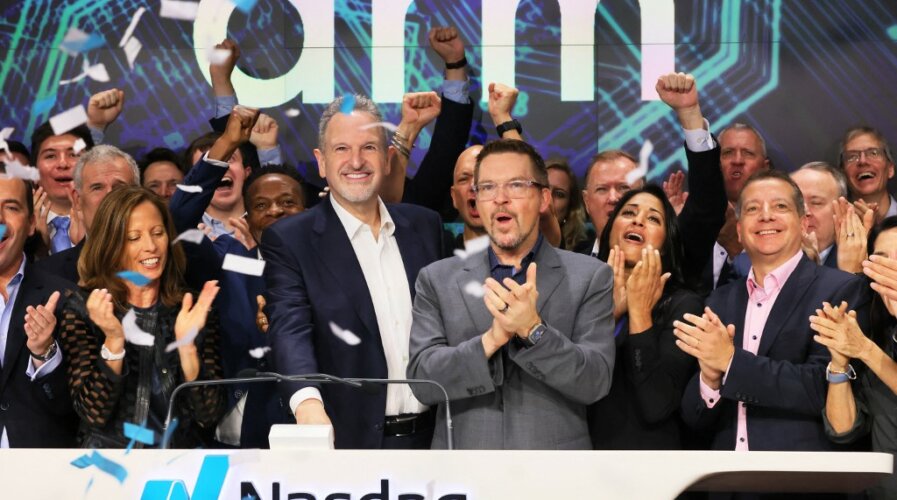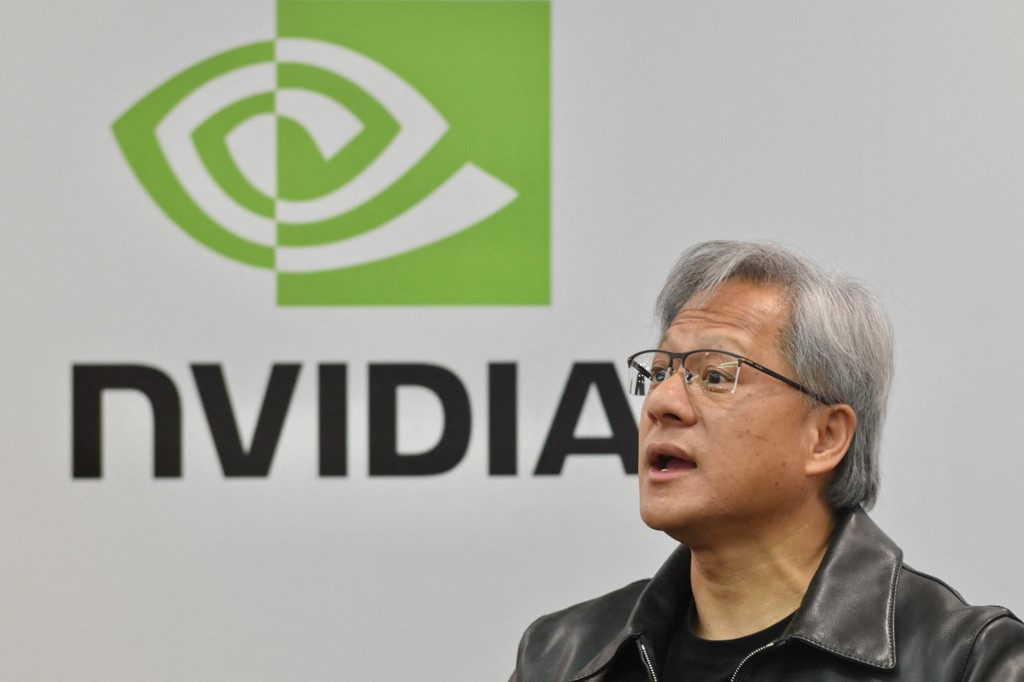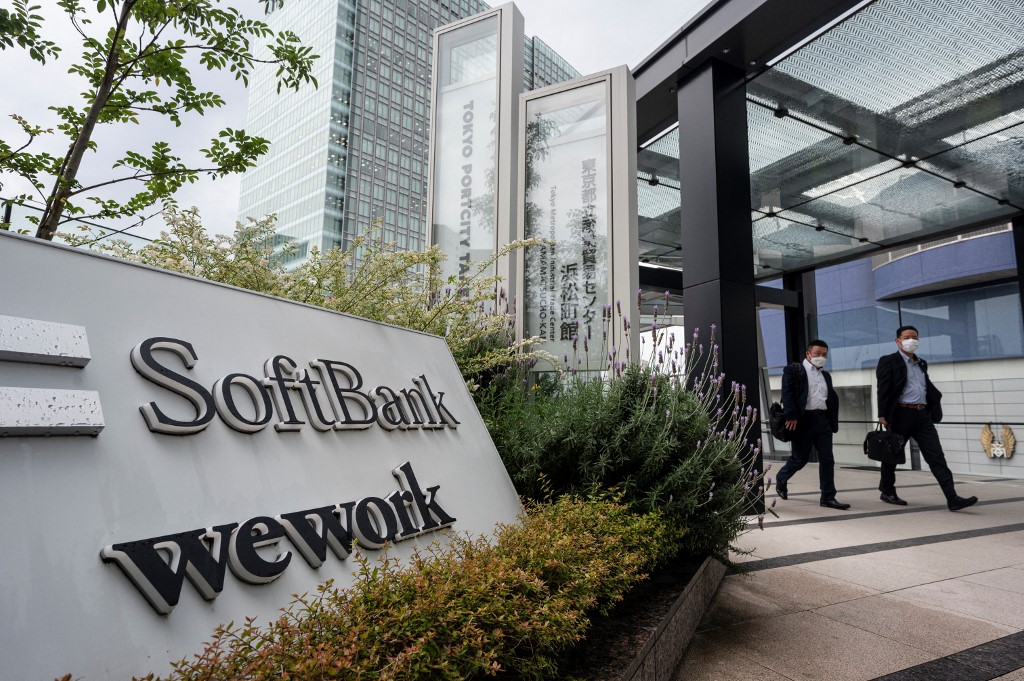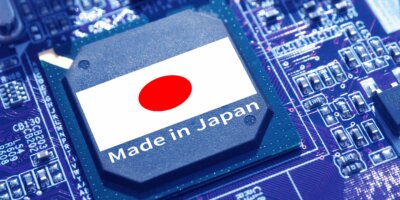
After a nearly two-year drought in the IPO market, UK-based chip designer Arm made a successful Nasdaq debut, finishing the day 25% higher and landing the company with a market cap of around US$65 billion. Source: AFP
How Arm rode the AI wave to end a two-year drought in the IPO market
• Arm and Softbank record major wins on Wall Street.
• Arm’s success comes in the wake of the failed Nvidia purchase bid.
• Softbank has a large stake in innovation through its Vision Fund.
Arm and Softbank have recorded major wins on Wall Street. The British chip designer climbed 25% in its Nasdaq trading debut, delivering a boost for both equity markets and Softbank founder Masayoshi Son.
Shares in the chip design firm closed at US$63.59 at the end of its first day of trading on Thursday, giving Arm a market value of more than US$65 billion. Including restricted share units, Bloomberg reported that Arm’s fully diluted value is near US$68 billion.
Arm’s Wall Street performance stands out in the worst year for the initial public offering (IPO) market since 2009, according to an analysis by EquityZen, a marketplace for private company stock.
Renaissance Capital, which tracks public offerings, recorded 73 IPOs in the U.S. — including Arm — that raised US$14.8 billion in 2023. It’s only a fraction of listings during 2021, when 397 companies raised US$142 billion.
Much of Arm’s impressive Wall Street IPO performance can be attributed to how the company — whose customers include many of the world’s largest tech companies, such as Apple, Google, Samsung and Nvidia — was able to positionto ride the wave of artificial intelligence (AI) sweeping Silicon Valley.
After all, Arm designs core semiconductor components and licenses the blueprints, along with the fundamental code governing how software communicates with chips. With its expertise in the energy-constrained world of battery-powered phones, Arm’s pitch is that its products are a better fit for data centers that consume immense amounts of electricity when running the latest generation of AI platforms.
Among public companies, the main beneficiary of the current AI boom has been Nvidia, which built an early lead for so-called AI accelerators — chips that excel at crunching data essential to the AI training process.

A groundbreaking US$40 billion deal to acquire Arm would have strengthened Nvidia’s ecosystem by adding its graphics and AI intellectual property to the British chip designer’s portfolio. Source: AFP
Nvidia’s attempted acquisition of Arm: How did this mega-deal crumble?
In September 2022, Nvidia — a giant in AI chips — announced its intention to acquire Cambridge-based Arm in a groundbreaking US$40 billion deal.
Forbes reported that the company’s stated goal was to boost Arm’s research and development as well as strengthen Nvidia’s ecosystem by adding the company’s graphics and AI intellectual property to Arm’s portfolio.
If successful, the transaction would have instantly transformed Nvidia into one of the most influential players in smartphone technology.
Unfortunately, the deal crumbled due to a conflict of interest and insurmountable regulatory hurdles.
While Nvidia has repeatedly affirmed that it would not interfere with Arm’s core business, its competitors — specifically Google and Microsoft — were concerned that the merger would limit rival access to Arm’s technology or even increase its license prices to give Nvidia’s homegrown product a competitive advantage. Simply put, it counted as anti-competitive conduct.
Then, there was the regulatory issue.
In 2021, Nvidia faced an in-depth probe by Britain’s competition regulator after the government ordered the Competition and Markets Authority to look closely at the proposed transaction. That same year, the Federal Trade Commission sued to block the US$40 billion acquisition, which was set to be completed within 18 months of September 2020.
The FTC’s lawsuit marked its first major merger decision to clamp down on monopolies and reinvigorate competition within the economy, The New York Times related.

The Japanese tech conglomerate has a US$100 billion venture capital fund named Vision Fund, which invests in some of the biggest names in tech. Source: AFP
What tech companies is Softbank currently investing in?
A number of Softbank’s tech investments come in the form of its Vision Fund, a US$100 billion venture capital fund founded in 2017 as part of the Japanese tech conglomerate. It has backed some of the largest names in tech today — from Uber to South Korean e-commerce titan Coupang.
Most recently, Nvidia and Softbank announced in May that they would be collaborating on a pioneering platform for generative AI and 5G/6G applications based on the Nvidia GH200 Grace Hopper superchip, which Softbank plans to roll out at new, distributed AI data centers across Japan.
According to Softbank Vision Fund’s website, the fund supports nine types of companies: consumer, edtech, enterprise, fin-tech, frontier tech, health tech, logistics, proptech, and transportation.
Here are some notable examples:
- ByteDance: The China-based company is best known for its video-sharing app TikTok and Douyin. In 2018, Bytedance closed US$3 billion of funding from SoftBank and other investors at a valuation of US$75 billion, according to sources familiar with the matter.
- Unacademy: Softbank led a US$150 million fundraising on this Indian edtech platform in 2020. Since its inception, the company has achieved spectacular growth, with over 50 million users and 1,000 educators.
- Abogen: In 2021, Chinese mRNA technology firm Suzhou Abogen Biosciences raised US$300 million from investors, including SoftBank Vision Fund, to support the development of its potential COVID-19 shot and other drug candidates.
- Advance Intelligence: In May 2023, this Singapore-based AI-driven tech company raised US$400 million in its Series D round of financing. It was led by SoftBank Vision Fund 2 and Warburg Pincus, with participation from key investors such as Northstar, Vision Plus Capital, Gaorong Capital, and Singapore-based global investor EDBI.
The nature of Wall Street is notoriously choppy, but the success of Arm and Softbank so far bodes well in terms of their long-term progress on the market.
READ MORE
- Safer Automation: How Sophic and Firmus Succeeded in Malaysia with MDEC’s Support
- Privilege granted, not gained: Intelligent authorization for enhanced infrastructure productivity
- Low-Code produces the Proof-of-Possibilities
- New Wearables Enable Staff to Work Faster and Safer
- Experts weigh in on Oracle’s departure from adland






